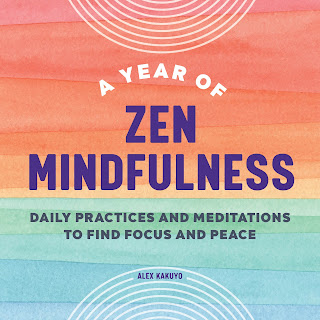In the meditation hall, I have an altar dedicated to Amida Buddha and the bodhisattvas Kannon and Jizo. It contains three statues, which bear their respective images along with candles and an incense burner.
The statues are of good quality, but they aren't that different from other figurines. They're white, standing approximately six inches tall. I bought them on Amazon, and for most of the day, there's nothing special about them.
That changes, however, when I perform my Buddhist liturgy. Twice a day, I light the candles on my altar, I burn incense as an offering, and I bow to those ordinary, everyday statues.
In that moment, they are transformed into celestial beings. They become a source of comfort. They become spiritual guides. They become holy and sacred in a way that other statues are not.
This transformation occurs because each time I bow in front of my altar I shift my relationship to the statues. I treat them as holy objects, so they become holy. More than that, they help me find holiness within myself.
This occurs because there is no separation between our inner and outer worlds. In fact, Buddhism teaches that there is no outer world. Everything we experience is an extension of our mind.
Thus, when we honor and venerate objects outside ourselves, we find that which is honorable and venerable within ourselves
There's a word for this in religious circles; sacrament.
A sacrament is a religious object or ritual that acts as an outward expression of our inner divinity.
We have many sacraments in Buddhism, and I love them all. The robes, the incense, and the chanting all bring something special and mysterious to the practice.
For me, it's easy to bow to Buddha. It's easy to care for my robes. It's easy to sweep the meditation hall.
But it's much harder to bow to a dirty toilet. It's much harder to care for dirty laundry. It's much harder to wash dishes, make laundry, and empty the litter box.
It's harder to do these things because they are ordinary.
But if Buddhism has taught me anything, it's that we don't seek out a holy life. As Buddhists, we take the life we have, and we make it holy.
When we bow to the statues on our altar they become celestial beings. When we bow to our ordinary life, it becomes a gateway to enlightenment.
We cut the grass with the same urgency that we sweep the meditation hall. We fold our robes and our laundry with equal care. And we clean the dirty toilet with the same reverence we offer the Buddha and Bodhisattvas.
When we do this our life becomes a mirror; reflecting our own divinity back at us. And we see the sacred nature of all things.
Namu Amida Butsu



Hoe true, Alex! I also find that when I do something for the love of another, that too transforms a chore into a holy act and invests the tools with holiness!
ReplyDeleteThank you for to write this good article, and to tell us your experiences. The daily meditation is a door for contact with the spirituality that gives real joy and harmony.
ReplyDeleteHave a nice summer.
Thank you for sharing your profound reflections on the transformative power of daily rituals and the sacredness inherent in ordinary objects and actions within the context of Buddhism. Your description of how the simple act of bowing to the statues on your altar can transmute them into vessels of spiritual significance resonates deeply with the essence of mindfulness and reverence.
ReplyDeleteIndeed, your words beautifully encapsulate the essence of the Buddhist understanding that there is no inherent separation between the outer and inner worlds. It's a reminder that our perception and intention imbue the mundane with sanctity, and through this lens, every moment becomes an opportunity for connection and enlightenment.
Thank you for sharing your profound insights on the sacredness of everyday actions. Your reflections beautifully illustrate how mindfulness and intention can transform mundane tasks into opportunities for spiritual growth and connection. The idea that reverence and care in our daily routines can reflect our inner divinity is truly inspiring. Namu Amida Butsu.
ReplyDeleteRegards,
Antique Buddhas
www.antique-buddhas.com